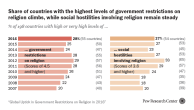Many adults in Central and Eastern Europe hold traditional viewpoints on social issues. Majorities oppose same-sex marriage and say homosexuality should not be accepted by society. And while abortion is legal in nearly every country included in the survey (Poland is an exception), public opinion about whether abortion should be legal is mixed, with women and men about equally supportive of legal abortion in most countries.
On balance, younger adults (ages 18 to 34) are more likely than others to accept homosexuality and same-sex marriage. Still, even in this cohort, majorities in most countries say homosexuality should not be accepted by society. College-educated respondents also are more likely than others to say society should accept homosexuality.
In Orthodox-majority countries, views on sexual and gender norms are more traditional and conservative than in Catholic-majority or religiously mixed countries. Adults in Orthodox countries are more likely than those elsewhere to reject homosexuality and to oppose same-sex marriage and legal abortion. Higher shares in Orthodox countries also favor traditional roles for women in marriage and society; many say that women have a social responsibility to bear children, that men should have greater rights to jobs when jobs are scarce and that wives must always obey their husbands.
On balance, men are more likely than women to hold traditional views on gender roles. For example, men are more likely than women to say a wife must always obey her husband. At the same time, in most countries men are about as likely as women to say they prefer a marriage in which both partners work and share household responsibilities.
The survey also asked whether several behaviors are morally acceptable, morally wrong or not a moral issue. Use of drugs, prostitution and homosexual behavior are widely seen as morally wrong across the region, while views are more mixed on abortion, drinking alcohol or having premarital sex. Fewer respondents view divorce or using contraception as morally wrong.
Homosexuality widely rejected
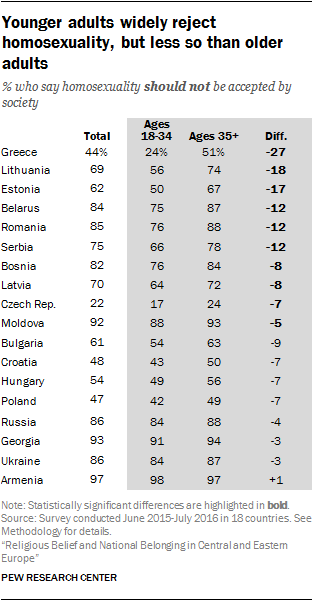
In most countries across Central and Eastern Europe, the dominant view is that homosexuality should not be accepted by society. In 13 of the 18 countries surveyed, majorities – including nearly all Armenians (97%) and two-thirds or more of the public in 10 other nations – take this stance. The Czech Republic has by far the lowest share of adults in the region who say society should reject homosexuality (22%).
In 10 of the 18 countries surveyed, younger adults (ages 18 to 34) are significantly less likely than older ones to say society should reject homosexuality. Still, even among these young adults, majorities in most countries say homosexuality should not be accepted by society.
Similarly, in most countries, respondents with a college education are less likely than others to say homosexuality should be rejected by society. But again, on balance, college-educated respondents say society should reject homosexuality.
In several countries, men are more likely than women to say homosexuality should be rejected by society.

Overall, rejection of homosexuality is more widespread in Orthodox-majority countries than elsewhere in the region. In eight of the 10 Orthodox countries surveyed, large majorities say society should not accept homosexuality.
Views on whether homosexuality should be accepted by society are more evenly split in Catholic-majority countries. In Hungary, for example, 54% say homosexuality should be rejected, as do 48% in Croatia and 47% in Poland. Lithuania is the only Catholic-majority country surveyed where a clear majority (69%) takes this position.
Limited support for legalization of same-sex marriage
The widespread idea that society should not accept homosexuality is accompanied by low levels of support for the legalization of same-sex marriage in the region. In none of the 18 countries are same-sex couples legally allowed to marry, and many have amended their constitutions to restrict marriage to unions of one man and one woman.
Only in the Czech Republic, which has allowed registered partnerships for same-sex couples since 2006, do most adults (65%) favor allowing gay and lesbian couples to marry legally. Four other countries surveyed – Croatia, Estonia, Greece and Hungary – also allow same-sex domestic partnerships or civil unions, but in these countries, no more than about a third of adults favor full same-sex marriage. Support for legalization of same-sex marriage is especially low in Russia (5%) and other Orthodox-majority former Soviet republics such as Armenia (3%), Georgia (3%), Moldova (5%) and Ukraine (9%).

Compared with others surveyed, Orthodox-majority countries typically have lower levels of support for legal same-sex marriage; in most Orthodox countries, fewer than one-in-five adults favor same-sex marriage.
Broadly speaking, age is a factor when it comes to views toward same-sex marriage. In most of the countries surveyed, younger adults (those under 35) are considerably more likely than their elders to favor legalized same-sex marriage (see Overview for exact figures). Greece shows the largest gap of this kind, with the level of support among younger adults (45%) more than double that among older people (19%). But, in a few countries, such as Armenia, Georgia, Moldova and Russia, there is very little support for same-sex marriage among adults of any age.
Education levels also affect support for same-sex marriage. On balance, people with college education are more likely than others to favor same-sex marriage. Still, except for the Czech Republic, in none of the countries surveyed do a majority of college-educated adults favor allowing gay and lesbian couples to marry legally.
Support for legalization of same-sex marriage is somewhat higher among religiously unaffiliated people compared with those who have a religious affiliation, but still, only in the Czech Republic (71%) and Croatia (61%) do a majority of unaffiliated adults favor same-sex marriage. And in Russia, just 8% of religious “nones” support gay marriage.
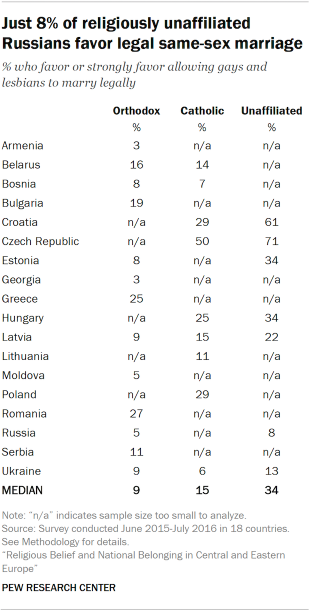
In countries with large enough samples of both Catholics and Orthodox Christians to analyze separately, there are generally only modest differences, if any, between the two groups. For instance, in Bosnia, 8% of Orthodox Christians and 7% of Catholics favor allowing same-sex marriage.
Mixed support for legal abortion
While abortion is legal on request in nearly all 18 countries surveyed (with the exception of Poland), public opinion is mixed on the issue. In fact, in just eight of the countries surveyed do clear majorities express support for legal abortion.
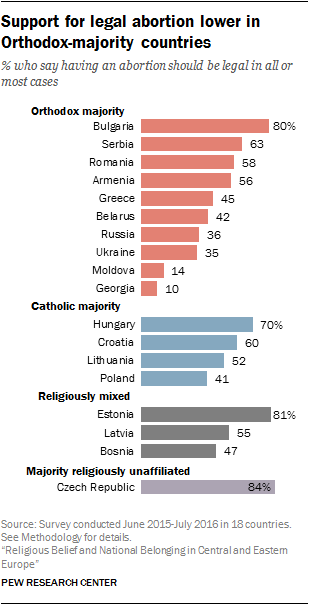
In 13 of the 18 countries surveyed, women and men are about equally likely to support legal abortion. Only in five countries – Armenia, Georgia, Latvia, Lithuania and Serbia – are women significantly more likely than men to say abortion should be legal in all or most cases.
Overall, adults in Orthodox-majority countries are less likely than those elsewhere to support legal abortion. Across the 10 Orthodox countries surveyed, the median share of people supporting legal abortion in all or most cases is 44%, compared with 58% across the other eight nations. Support is especially low in Georgia and Moldova, where just 10% and 14%, respectively, say abortion should be allowed in all or most cases – even though abortion is legal in both countries. On the other hand, in Poland, where there are legal restrictions on abortion, 41% say women should be able to have an abortion in all or most cases.
College-educated and younger respondents (ages 18 to 49) are more likely than others to favor legal abortion in all or most cases.
Besides country of residence, religion tied to views on legal abortion, gay marriage
While views on abortion and same-sex marriage are closely connected to the country a respondent lives in, opinions also are tied to a respondent’s religious observance and religious identity. Even after controlling for gender, age, education and respondents’ country of residence, those who say religion is “very important” in their lives are more likely than others to oppose same-sex marriage and legal abortion. And overall, religiously unaffiliated respondents are more likely to favor both of these things when holding other factors constant.
Statistical analysis also shows that age affects views on legal gay marriage, but matters less when it comes to views on abortion. Younger adults (ages 18 to 49) are more likely than their elders to favor legal gay marriage, even after accounting for gender, education and religion, but they are about equally likely to support legal abortion.
Traditional views on gender roles more common in Orthodox-majority nations
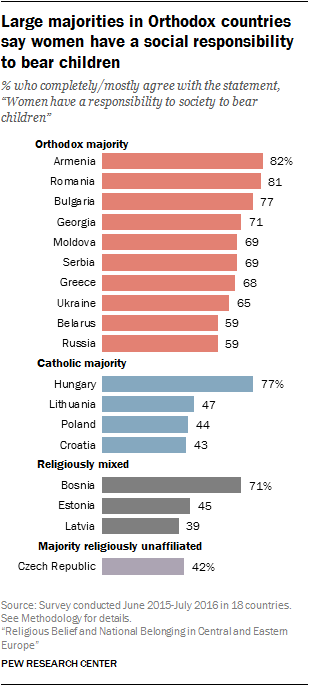
Majorities of adults in 12 of the 18 countries surveyed agree with the statement, “Women have a responsibility to society to bear children.”
On balance, women are significantly more likely than men to disagree with the statement, although in just five of the 18 nations do majorities of women disagree that women have a societal responsibility to bear children.
As with many other social issues, older adults (ages 35 and older) and those without college degrees are more likely to take the traditional position – in this case, that women have a responsibility to society to bear children.
Adults in Orthodox-majority countries also are generally more likely than those elsewhere in the region to take the traditional stance; indeed, majorities in all 10 Orthodox countries surveyed, including about eight-in-ten in Armenia and Romania, say women have a societal responsibility to bear children.
Populations in other countries are considerably less likely to agree with this idea. Of the eight non-Orthodox countries included in this survey, only in two – Hungary and Bosnia – do majorities say women have a societal obligation to bear children.
The two countries where people are most likely to disagree with this sentiment are the Czech Republic (56%) and Latvia (57%).
Many adults say men should have greater employment rights than women
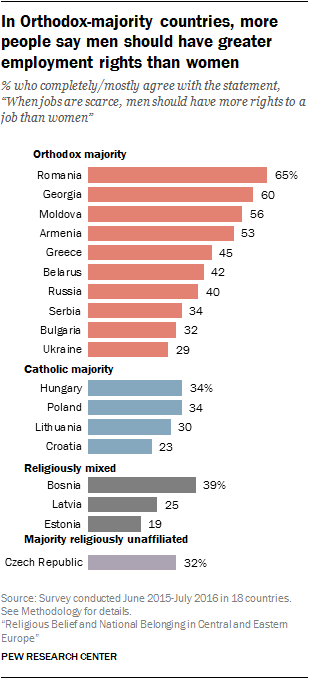
Majorities or pluralities in most countries across Central and Eastern Europe disagree with the statement, “When jobs are scarce, men should have more rights to a job than women.” Still, considerable minorities in several countries – and majorities in a few – either completely agree or mostly agree that when jobs are scarce, men should have more rights to a job than women.
On balance, men are more likely to agree with this statement, as are adults with less than a college education. In a few countries, adults under 35 are less likely than older people to say men should have greater employment rights than women, but in the vast majority of countries surveyed there are no statistically significant differences by age on this question.
Respondents in Orthodox-majority countries are more likely than those elsewhere to favor these employment rights for men – including about half or more who say this in Armenia, Georgia, Moldova and Romania.
In Orthodox-majority countries, roughly three-in-ten or more agree that a wife must obey her husband

In general, people in Central and Eastern Europe tend to disagree with the statement, “A wife must always obey her husband.” But respondents in Orthodox-majority countries are more likely than people elsewhere to agree that wives must obey their husbands – especially in Armenia (where 82% agree) and Romania (72%).
In countries without an Orthodox majority, this position is less accepted. In Estonia, for example, just 18% accept this view. And in all four of the Catholic-majority countries surveyed (Croatia, Hungary, Lithuania and Poland), large majorities oppose the idea that a wife must always obey her husband.
Women are significantly less likely than men to agree that wives must always obey their husbands. And college-educated adults also are less likely than those with less education to agree with the statement.
The survey also finds that nationalist sentiment is tied to conservative social views. People who agree that their culture is superior to others, or that there is a conflict between their country’s traditional values and those of the West, are more likely to say a wife is obligated to obey her husband.
Majorities across all countries surveyed prefer a marriage where partners share work and household responsibilities
All respondents (not just those who are married) were asked which of three types of marriages they think is ideal: one where the husband and wife both work and earn money and both look after the household and children, one where the wife works and the husband looks after the household and children, or one where the husband works and the wife looks after the household and children.
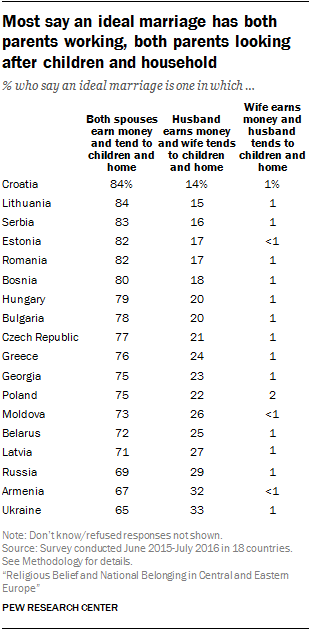
Clear majorities in all countries surveyed favor a marriage in which both spouses work and share household responsibilities. Preference for this type of marriage ranges from a low of 65% in Ukraine to a high of eight-in-ten or more in Croatia, Lithuania and several other countries.
In most countries, college-educated adults are more likely than others to favor a marriage with shared responsibilities. That said, majorities of people without a college degree in every country surveyed also favor this type of arrangement.
Generally, women are more likely than men to say they prefer a marriage in which both spouses work and share household tasks, but in more than half the countries, there are no significant differences between the attitudes of men and women on this issue. Similarly, in a few countries, younger adults (ages 18 to 34) are more likely than older adults to favor a marriage with shared responsibilities. But, again, in most countries there are no significant differences by age.
Across the region, Orthodox Christians are about as likely as Catholics and religious “nones” to say they prefer a marriage with shared responsibilities. But Muslim adults are less likely than others to favor this arrangement. Still, about half or more of Muslims in every country with a Muslim population large enough for analysis say the ideal marriage is one in which both spouses work and share household responsibilities and child-rearing.
Nationalism goes hand in hand with conservative views on gender norms and homosexuality
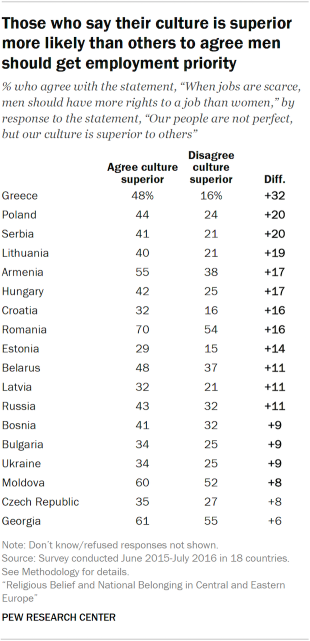
High levels of social conservatism in Central and Eastern Europe appear to go hand in hand with widespread nationalist sentiments.
The survey finds that those who completely or mostly agree that their culture is superior to others are more likely to take conservative positions on gender norms and sexuality. For example, those who see their culture as superior are more likely to agree that men should be given employment preference over women when jobs are scarce. They also are more likely than others to say homosexual behavior is morally wrong.
Statistical analysis of the data shows that nationalist sentiment is more closely associated with views on employment preference for men than is religious observance. And when it comes to several other gender issues, including wives’ obligation to obey their husbands or women’s responsibility to bear children, nationalist sentiment is about as closely associated with views on these issues as religious observance.
While nationalist sentiment also is strongly associated with views toward homosexuality, religious observance is an even more salient factor.
Drugs, prostitution widely seen as morally wrong; divorce, contraception less so
Respondents were asked whether various behaviors are morally acceptable, morally wrong or “not a moral issue.” Majorities in most countries surveyed believe that drug use, prostitution and homosexual behavior are morally wrong, while fewer adults say this about abortion, drinking alcohol, premarital sex, divorce or using contraceptives.
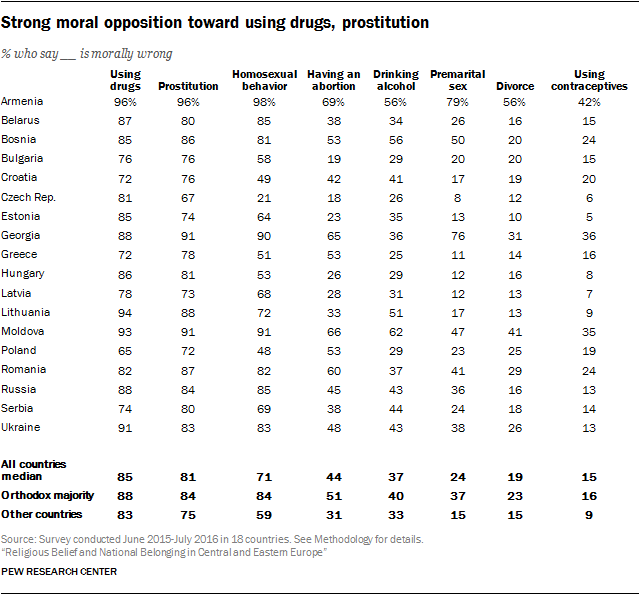
Younger adults (ages 18 to 34) are less likely than their elders to say many of the behaviors mentioned in the survey are morally objectionable. And college-educated adults are less likely to have moral reservations about many of these behaviors than are those with less education. There are fewer consistent differences in the opinions of men and women on these issues, yet women are less likely than men to say that drinking alcohol or prostitution are morally acceptable.
Overall, respondents in Orthodox-majority countries are more likely than those elsewhere to take traditional or conservative stances on sexual norms – that is, to morally oppose contraceptive use, abortion, premarital sex and homosexuality. Roughly half or more in every Orthodox-majority country say homosexuality is morally wrong, including overwhelming majorities in Armenia (98%), Moldova (91%) and Georgia (90%). In Poland, meanwhile, just 48% feel this way, and in the Czech Republic, just 21%.
In general, religiously unaffiliated respondents are less likely than others to find these behaviors morally wrong, while Muslim respondents are especially likely to find them immoral. For instance, in Russia, 18% of religious “nones” say premarital sex is morally wrong, compared with 36% of Orthodox Christians and 64% of Muslims who say the same.
Across Central and Eastern Europe, most say you can be moral without believing in God
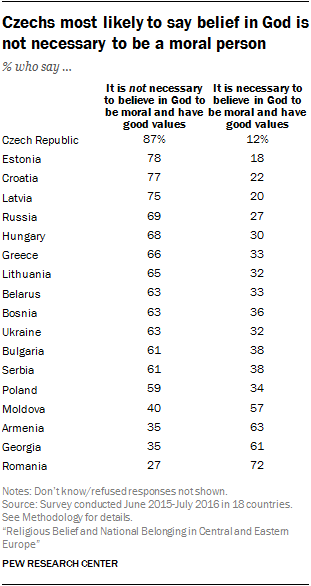
Survey respondents were asked whether it is necessary to believe in God to be moral and have good values. Majorities of adults in most of the Central and Eastern European countries surveyed say people can be moral and have good values even if they don’t believe in God.
This view is most common in the Czech Republic, where 66% of respondents say they do not believe in God and 87% say it is not necessary to believe in God to have good values. But even in some countries where belief in God is far more widespread, such as Greece and Bosnia, majorities say it is not necessary to believe in God to be moral and have good values.
The only countries where majorities take the opposite view – that belief in God is necessary to be moral and have good values – are the Orthodox-majority countries of Armenia, Georgia, Moldova and Romania. In each of these countries, more than nine-in-ten adults express belief in God.
People who say religion is very important in their lives are much more likely than others to link personal morality to a belief in God. And Muslims, on balance, are more likely than members of other religious groups to take this view.
On the other hand, religiously unaffiliated adults are less likely than others to say belief in God is necessary to be moral. Similarly, college-educated adults are much less likely than those with a secondary education or less to say it is necessary.




